

Having never read a Ken MacLeod novel before, I found my introduction to him to be a bit rocky. The opening chapters of The Restoration Game were replete with irritants. After that it settled down and started to tell an interesting story, but never quite managed to completely convince. It had the right ingredients for a better tale, but it could not get the doses right and wound up feeling, for all its positive points, out of balance.
The story’s protagonist, Lucy Stone, spent most of her childhood in the fictional Soviet Republic of Krassnia, but now works for a computer game company in Edinburgh. Her company is hired to make a Krassnian version of a popular medieval computer game, and her heritage and lingual abilities, rare to be found in the West, are the reason her company was chosen. There is more to this request for a Krassnian video game than is initially apparent, however. Lucy’s mother is a former CIA operative, and another man who might be her father is mired in the same kind of political intrigue. Through them Lucy gets entangled in an international plot the details of which are murky but the danger in which becomes increasingly apparent. Finally, she finds herself on a mission with consequences so far reaching that “epic” does not seem to do them justice.
[continue reading…]
Help Promote Prometheus Unbound by Sharing this Post
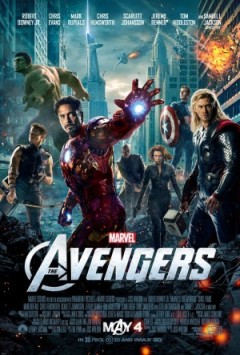
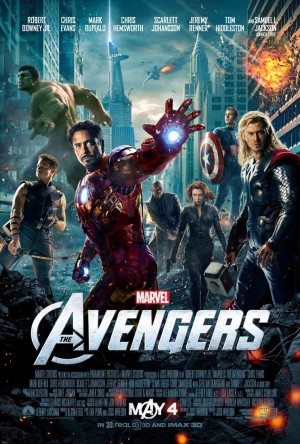
After a series of movies about individual superheroes, movies that gave us their origin stories, we have finally been treated to the culmination of the last few years and so many millions of man-hours: The Avengers. The films leading up to it were generally fair to middling, I thought, with the first Iron Man rising maybe half a skosh above that level. The latest comes heralded by uniformly positive reviews. It is, we are told, much better than one would expect. According to most reviews, there is a greater focus on character than one usually gets in an action movie, but there is no skimping on set pieces. The reality, for me, was more of the same: half a skosh above decent.
Loki, Thor’s brother and fellow god, wants to rule the Earth. He makes a deal with some aliens who agree to conquer the Earth for him in exchange for the Tessaract, an artifact of immense power, which will also play a role in transporting the invading army to New York to begin the takeover. Loki steals the Tessaract from Nick Fury, who then assembles the Avengers to find him, find it, find out what the plan is, and do anything else that needs a little superpower elbow grease. A lot of bickering between incompatible personalities and a whole lot of violence and destruction ensue.
The plot is unremarkable but perfectly adequate, and that is a good description for the movie as a whole. There are no scenes whose impact lingers in your memory after the credits have rolled, no wonderful development of character, no stunning visuals, no lines of great insight, no “aha!” moments. What it does have, to go with its serviceable story, is competent direction, a few genuinely amusing visual jokes, a bevy of one-liners that play well to an opening-weekend audience, and the action set pieces that many movie goers — mostly male — crave sometimes to the exclusion of all else.
[continue reading…]
Help Promote Prometheus Unbound by Sharing this Post


The Cabin in the Woods is a supernatural genre-bender penned by Joss Whedon and Drew Goddard. It is a bizarre story that grows odder as it goes, but there is a focus on character, a decent atmosphere, success in keeping a young and handsome cast from becoming mere plastic eye candy, some intelligent dialogue and a few inspired approaches to scenes. There was enough skill involved in its creation to make a fine work. It had me at the opening; it kept me as events unfolded; it lost me at the end.
To summarize the plot past a certain point is to risk ruining a first viewing. At the beginning, five college students go to a cabin in a woods to spend a weekend drinking, playing games, and committing acts that many religions proscribe outside of matrimony. It is safe to share that the students are being monitored and manipulated, because this aspect is revealed from the outset. From the conversations of the monitors we piece together that the students are going to be put through some sort of gruesome trial, and that these students will, unwittingly, determine the nature of that trial. Beyond that I prefer to say only that beneath this bizarre surface is a whole lot more story to be uncovered.
There are a number of things the movie gets right. Despite the fact that the nature of the cabin is explained early on, there is still a mood of enigma about everything. The monitors become the mystery, rather than the cabin. The dialogue, despite Whedon’s continuing penchant for corny one-liners at the wrong moment, is streamlined, full of character, and delivers just enough information without talking directly to the audience. Tantalizing phrases suggest a deeper plot, hints of which are continuously doled out to us. Even one aspect that seemed initially disappointing, regarding the trite order in which characters must die in a horror movie, is given a surprising yet sufficient explanation later on.
[continue reading…]
Help Promote Prometheus Unbound by Sharing this Post


The latest craze to seize the literary world has been transformed, according to the law of Hollywood, into cinema. The Hunger Games, based on the novel by Suzanne Collins, is helmed by Gary Ross and co-written by the author herself. Targeting a younger crowd, the movie yet boasts enough maturity and craftsmanship to appeal to other demographics. I continue to await the next science fiction masterpiece, but if the interlude between masterpieces had more movies of this caliber, I would gripe a good deal less.
In the world of the story, an Empire has put down a rebellion by thirteen districts. The thirteenth district was destroyed and the other twelve must, each year, supply a male and female between the ages of 12 and 18 to participate in the Hunger Games. The 24 participants train for a few weeks before competing in a winner-take-all gladiatorial contest that leaves only one alive. Interspersed in their training are interviews with the media, banquets, and chances to impress viewers and thereby win sponsors who can assist the contenders during the competition.
Katniss Everdeen (Jennifer Lawrence) is a young girl in district twelve. She hunts for food in forbidden territory but is permitted to do so because she sells much of her catch to the guards (the first in a series of welcome demonstrations of governmental corruption). When her younger sister’s name is pulled as the female representative for the Games, Katniss demands to go as a volunteer in her stead.
[continue reading…]
Help Promote Prometheus Unbound by Sharing this Post
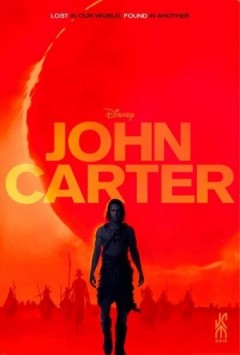
 There is a certain charm to the recently released John Carter, helmed by Andrew Stanton. The two leads, Taylor Kitsch’s John Carter and Lynn Collins’s Dejah Thoris, have enough chemistry to draw the audience in; the world of Mars itself is a treat for the eyes; the basic plot is well within the bounds of standard epic adventure but perfectly sound; and many of the situations that the characters find themselves in have real potential, albeit never fully realized. In short, there was a grand story there for the telling, had there been a director capable enough to pull it off. There was not, and consequently a theatergoer is likely to leave feeling frustrated by the large gap between what was and what might have been.
There is a certain charm to the recently released John Carter, helmed by Andrew Stanton. The two leads, Taylor Kitsch’s John Carter and Lynn Collins’s Dejah Thoris, have enough chemistry to draw the audience in; the world of Mars itself is a treat for the eyes; the basic plot is well within the bounds of standard epic adventure but perfectly sound; and many of the situations that the characters find themselves in have real potential, albeit never fully realized. In short, there was a grand story there for the telling, had there been a director capable enough to pull it off. There was not, and consequently a theatergoer is likely to leave feeling frustrated by the large gap between what was and what might have been.
After a useless prologue that actually ruins the later effect when the protagonist appears on Mars for the first time, we are introduced to John Carter, a former officer of the Confederacy and current gold prospector. When the United States army tries to conscript him to fight the Apaches in Arizona, he tells them he owes them nothing and prefers to go about his own business. This defiance of the state should not excite the libertarian too much, however, because just moments before, he was busy abusing the rights of a shop owner, refusing to leave the man’s store when he wouldn’t sell. Carter’s reticence to join and fight, it turns out, is more about his bleak personal cynicism after the deaths of his wife and child than it is about a freedom-friendly moral code.
In the course of his attempt to escape the clutches of the war machine, he stumbles upon a cave where he is ambushed by a strangely dressed man with seemingly magical powers (the reason for the ambush is never made clear, though one cannot help but notice that the plot would have come to a standstill without it). After killing the ambusher, Carter takes a medallion from his cadaver and gets transported to a strange land he eventually learns is the planet Mars. He discovers he has extraordinary new powers with which he amazes some of the creatures he finds there.
Eventually, he meets a woman, a princess, fleeing an arranged marriage that could stop a war between two city-states. She wants to use him and his incredible physical prowess for her ends, which are to save her city-state from destruction without getting married; he wants to use her for his, which are to return to Earth with the help of her esoteric knowledge of his amulet. They form a distrustful alliance and adventure ensues. I’ll leave it to the reader to guess whether or not they fall in love.
[continue reading…]
Help Promote Prometheus Unbound by Sharing this Post
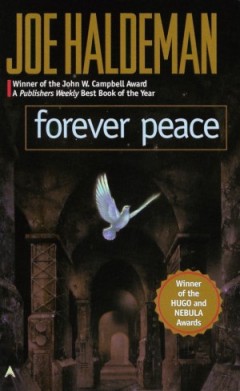
When Joe Haldeman, early in his career, penned his 1970s science fiction classic The Forever War, he claimed his niche in the genre. Whatever happened after that, however well or poorly he performed, however much or little he expanded his legacy, his place at the table was secure. The general consensus is that, despite a career with several successes, he has never managed to equal that early novel. My experience with Mr. Haldeman is too limited to opine on that point, but I can say that in 1997, when he wrote Forever Peace, he definitely fell short but did not miss by a large amount.
Julian Class, a physicist and conscript in the American armed forces, is the protagonist of a story that transpires in the 2040s. The United States, now turned into a centrally planned economy, is at war with guerrillas all over South America and Africa. The principal weapon on the ground is the soldierboy, a deadly robot used for anything from patrolling to reconnaissance to assaults and assassinations. The soldierboys are remote controlled by soldiers like Class who are “jacked in” to the soldierboy through a plug surgically inserted into their brains, Matrix-style (perhaps it would be fairer to say Neuromancer-style).
An entire squad of soldiers controlling the soldierboys attain a oneness with each other, such that everyone’s feelings, thoughts, and experiences are collectively shared. More than simply walking a mile in another’s shoes, this jacking is akin to walking an entire life in another’s shoes, socks, pants, underwear, and t-shirt. At one point Julian Class, who is black, reflects that there is no racism among these soldiers, because it simply is not possible to be racist when you have essentially been another race, or several other races, for days at a time. This idea anticipates a larger revelation made later, which becomes the main point of the book.
[continue reading…]
Help Promote Prometheus Unbound by Sharing this Post
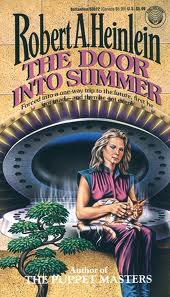
The Door into Summer
The Door into Summer, by Robert Heinlein, is the author’s last adult novel written before his arguably three most famous works: Starship Troopers, Stranger in a Strange Land, and The Moon is a Harsh Mistress. The book benefits from the strong points that every Heinlein novel displays, but in other ways it almost feels like the author was holding back. Like Alfred Hitchcock, Heinlein had some great works mixed in with a lot of decent ones, and the present novel fits squarely into the latter category. In researching it, I came across a quote by John W. Campbell that sums up for me how I feel about certain Heinlein novels, The Door into Summer included: “Bob can write a better story, with one hand tied behind him, than most people in the field can do with both hands. But Jesus, I wish that son of a gun would take that other hand out of his pocket.”
The narrator, Dan Davis, is a gifted engineer who cannot see eye to eye with his business partner and best friend, Miles Gentry. Miles and Dan’s fiancée, Belle, conspire to steal Dan’s company from him and then send him into hibernation for thirty years. He wakes up in the year 2000, destitute, but begins working to build himself back up and maybe get some revenge. Along the way, as Dan investigates what has happened since he was put into the “Long Sleep,” strange clues begin turning up, indicating that there is more going on than he may realize.
[continue reading…]
Help Promote Prometheus Unbound by Sharing this Post




















